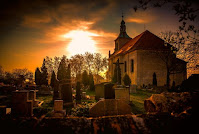Heirs of the Resurrection
The biblical faith is forward-looking and foundational to its doctrine of salvation is the future resurrection of the righteous dead. That event will also mark the arrival of the New Creation. The New Testament links this to two events. First, the past Resurrection of Jesus. Second, his future arrival at the end of the age. Our salvation remains incomplete without our resurrection.
This fundamental hope has been pushed into
the background to make way for ideas alien to the Bible. While this is due to
many factors, it is especially because of the importation of pagan beliefs and cultural
perspectives into the Apostolic Tradition. All too often, popular ideas about the
afterlife have more in common with Neoplatonism, paganism, and Gnosticism than with
the teachings of Jesus and his Apostles.
 |
| [Photo by Simeon Muller on Unsplash] |
Writing to the assemblies of Rome, Paul declared that if the same Spirit that raised Jesus from the dead dwells in us, then He that “raised Christ Jesus from among the dead will quicken even our death-doomed bodies.” This future “quickening” of our bodies is connected to the Death and Resurrection of Jesus - (Romans 8:9-11).
We possess “death-doomed bodies,”
not because they are physical, but because we are condemned to bondage, decay,
and death due to sin. Because of Adam’s transgression, we remain subject to
death. We are, in the truest sense, mortal.
If God is to redeem us and recover all that
was lost millennia ago, our salvation must include the human body. Likewise,
the creation itself was also condemned to corruption by the disobedience of Adam.
It must be redeemed likewise.
Because we have the Spirit of God, it confirms we are “coheirs” with His Son. We, therefore, will be “glorified together with him.” Just as he was resurrected, we will be raised from the dead with immortal bodies. The creation is “ardently awaiting” that day since, like humanity, it has been subjected to “vanity” and death and longs for liberation.
On that day, the “creation itself will
be freed from the bondage of decay into the freedom of the glory of the sons of
God.” The possession of the Spirit is the “first fruits” of this
future resurrection life, therefore, we also “ardently await the adoption,
the redemption of our body.” Paul is speaking about the bodily resurrection
of believers and the arrival of the new creation – (Romans 8:15-23).
RESURRECTION IS PIVOTAL
In Corinth, some believers were denying the future resurrection. Paul responded by reminding the Corinthians
of the Gospel he first delivered to
them - “How that Christ died for our
sins, and was buried, and that he has
been raised on the third day.”
If there is no future resurrection, then “even Christ has not been
raised,” and if not, then the Gospel is void, the Apostles lied, and we are
all “yet in our sins,” without hope and “most to be pitied.” Again,
Paul links the future resurrection of believers with the past Death and Resurrection
of Jesus Christ - (1 Corinthians 15:1-20).
His Resurrection was the “first fruits of those who have fallen
asleep.” Just
as death came through Adam, the “raising of the dead will come through one
man, and in Christ, all will be made alive.” This will occur at the “arrival” or ‘Parousia’ of Jesus
when he consummates the kingdom and subjugates all his enemies, especially, the
“Last Enemy, Death.” With his arrival, death itself will cease – (1
Corinthians 15:20-28).
Resurrection does not mean the resuscitation of “death-doomed bodies,”
nor does it mean living in a disembodied state. Our mortal body is “sown in
corruption but will be raised in incorruption.” It will be a body fitted
for life in the Spirit.
Paul did not see bodily existence as incompatible with the Spirit. The difference is the kind of body one has, whether a “body of the soul” or a “body of the spirit.” Just as we now bear the “image of the Man of the Earth,” Adam, we will “bear the image of the Man of Heaven,” Jesus.
When he does “arrive,” we who remain
alive will be transformed, and those who have died will be raised from the dead.
Both groups will receive “immortality…for whenever this
mortal will clothe itself with immortality, then will be brought to pass the
saying, Death has been swallowed up victoriously,” for death
will cease forever – (1 Corinthians 15:50-57).
When the
Thessalonians expressed grief over the deaths of fellow believers, Paul
reminded them that they were not without hope. If we “believe that Jesus
died and rose again, so God will bring with him those who have fallen asleep through
Jesus.”
He will
descend from Heaven and the “dead in Christ will rise first.” After
that, the living and now resurrected saints together will “meet” him as
he arrives from Heaven, and so, “evermore we will be with the Lord.”
 |
| [Photo by Martin Vysoudil on Unsplash] |
As in Corinth, so in Thessalonica, Paul connected the future resurrection to the past raising of Jesus from the dead, and his “arrival” at the end of the age. He portrayed it as a collective event; meaning, all believers will be raised and transformed when he arrives.
In his letter to the Philippians, Paul
demonstrated just how foundational the hope of resurrection was to his faith.
Having counted all things as loss for the sake of Christ, his life centered on
pursuing him - “If by any means I may attain to the resurrection
from among the dead.” If he did not participate in that
resurrection, his salvation would remain incomplete – (Philippians 3:10-11).
The consummation
of the biblical hope of salvation lies in the future. While upon repentance our
sins are forgiven and we become “coheirs with Christ,” the full realization
of that promise will remain incomplete until the return of Jesus. On that day,
dead believers will be resurrected, and those remaining alive on the Earth will
be transformed, and together, all saints will be with Jesus forever.
RELATED BOASTS:
- Resurrection and Salvation - (Central to salvation in the Apostolic tradition is the bodily resurrection of the dead when Jesus arrives to gather his saints)
- Earnest of the Inheritance - (Believers are the heirs of Abraham, and the possession of their inheritance is secured by possession of the Gift of the Spirit)
- Spirit and Inheritance - (The Gift of the Spirit is foundational to the New Covenant, and it is the first fruits of the Resurrection and the New Creation)


Comments
Post a Comment